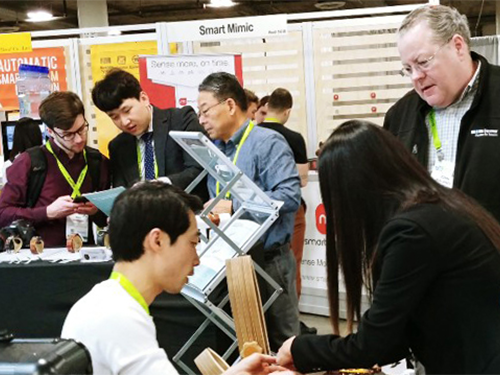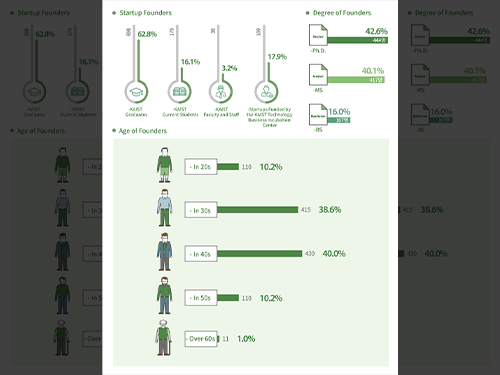startup
-
 KAIST Presents Innovations at CES 2019
Ten of the most innovative technologies spun off from KAIST made a debut at the Consumer Electronics Show (CES) 2019, the world’s largest consumer electronics and IT exhibition being held in Las Vegas from January 8 to 11. The KAIST booth at the CES featured technologies made by KAIST research teams and five startup companies including LiBEST, Memslux, and Green Power. In particular, the KAIST Alumni Association invited 33 aspiring alumni entrepreneurs selected from the KAIST Startup Competition to the show.
At the exhibition, KAIST is presenting innovations in the fields of AI and Bio-IT convergence for the Fourth Industrial Revolution. These include real-time upscaling from Full HD to 4K UHD using AI deep learning-based convolutional neural networks (Professor Munchurl Kim, School of Electrical Engineering) and an AI conversation agent that responds to user’s emotions (Professor Soo-Young Lee, School of Electrical Engineering).
Other technologies include optimal drug target identification by cancer cell type through drug response prediction to be used in personalized cancer treatments (Professor Kwang-Hyun Cho, Department of Bio and Brain Engineering), a nanofiber-based color changing gas sensor with greater sensitivity than conventional paper-based color changing sensors (Professor Il-Doo Kim, Department of Materials Science and Engineering), and functional near-infrared spectroscopy (fNIRS) for brain imaging and muscle fatigue measurement (Professor Hyeonmin Bae, School of Electrical Engineering).
The KAIST booth also features startups founded by KAIST alumni including LiBEST with a flexible lithium polymer secondary cell optimized for smart wearable devices and Rempus with a high-performance lithium ion cell packaging technology for outstanding safety, high capacity, long life, and fast charging.
Green Power and Smart Radar Systems are also joining the booth with a highly efficient and eco-friendly wireless charging system for electrical cars, and a 4D image radar sensor that detects 3D images and speed in real time for applications in self-driving cars, drones, and security systems respectively.
Faculty-founded startup Memslux (CEO Jun-Bo Yoon, School of Electrical Engineering) is presenting a transparent surface light source solution for next-generation display devices.
Associate Vice President of Office of University-Industry Cooperation Kyung Cheol Choi said, “I believe that universities should play a role in connecting technological innovations to business startups for creating value at a global level. In that sense, it is a great opportunity to present innovative technologies from KAIST and promote outstanding KAIST startups at CES 2019. Hopefully, this experience will lead to joint R&D, investment, cooperation, and international technology transfer contracts with leading companies from around the world.”
Here are the five key technologies presented by KAIST at CES 2019.
2019.01.10 View 9222
KAIST Presents Innovations at CES 2019
Ten of the most innovative technologies spun off from KAIST made a debut at the Consumer Electronics Show (CES) 2019, the world’s largest consumer electronics and IT exhibition being held in Las Vegas from January 8 to 11. The KAIST booth at the CES featured technologies made by KAIST research teams and five startup companies including LiBEST, Memslux, and Green Power. In particular, the KAIST Alumni Association invited 33 aspiring alumni entrepreneurs selected from the KAIST Startup Competition to the show.
At the exhibition, KAIST is presenting innovations in the fields of AI and Bio-IT convergence for the Fourth Industrial Revolution. These include real-time upscaling from Full HD to 4K UHD using AI deep learning-based convolutional neural networks (Professor Munchurl Kim, School of Electrical Engineering) and an AI conversation agent that responds to user’s emotions (Professor Soo-Young Lee, School of Electrical Engineering).
Other technologies include optimal drug target identification by cancer cell type through drug response prediction to be used in personalized cancer treatments (Professor Kwang-Hyun Cho, Department of Bio and Brain Engineering), a nanofiber-based color changing gas sensor with greater sensitivity than conventional paper-based color changing sensors (Professor Il-Doo Kim, Department of Materials Science and Engineering), and functional near-infrared spectroscopy (fNIRS) for brain imaging and muscle fatigue measurement (Professor Hyeonmin Bae, School of Electrical Engineering).
The KAIST booth also features startups founded by KAIST alumni including LiBEST with a flexible lithium polymer secondary cell optimized for smart wearable devices and Rempus with a high-performance lithium ion cell packaging technology for outstanding safety, high capacity, long life, and fast charging.
Green Power and Smart Radar Systems are also joining the booth with a highly efficient and eco-friendly wireless charging system for electrical cars, and a 4D image radar sensor that detects 3D images and speed in real time for applications in self-driving cars, drones, and security systems respectively.
Faculty-founded startup Memslux (CEO Jun-Bo Yoon, School of Electrical Engineering) is presenting a transparent surface light source solution for next-generation display devices.
Associate Vice President of Office of University-Industry Cooperation Kyung Cheol Choi said, “I believe that universities should play a role in connecting technological innovations to business startups for creating value at a global level. In that sense, it is a great opportunity to present innovative technologies from KAIST and promote outstanding KAIST startups at CES 2019. Hopefully, this experience will lead to joint R&D, investment, cooperation, and international technology transfer contracts with leading companies from around the world.”
Here are the five key technologies presented by KAIST at CES 2019.
2019.01.10 View 9222 -
 KAIST Alumni Take a Strong Hold on Tech-Based Startups
Average sales for KAIST alumni startups in 2015 doubled from the previous year to 20.7 billion KRW. They reportedly recorded approximately 37-times higher sales than non-KAIST alumni startups, demonstrating that KAIST is emerging as strong tech-based venture startup incubator.
According to a white paper on the Profile and Performance of KAIST Startups released recently, the number of KAIST startups stood 1,112, of which 877 were founded by alumni (78.9%), 36 by faculty and staff (3.2%), and 199 by those funded by the KAIST Technology Business Incubation Center (17.9%) at the end of 2015.
The total sales of KAIST startups stood at 13.6 trillion KRW in 2015, a 25% increase compared to the previous year. KAIST alumni startups created about 32,400 jobs in that year.
Most KAIST founders majored in engineering (649 people, 71.1%), followed by business (121 people, 13.3%), natural sciences (86, 9.4%), life science and bio engineering (32 people, 3.5%), and liberal arts and convergence science (24 people, 2.6%), making a total of 913 founders, excluding the 199 startups funded by KAIST Technology Business Incubation Center.
By department, most founders come from electrical engineering (148 people, 16.2%), followed by mechanical engineering (135 people, 14.8%), and computer science (114 people, 12.5%).
KAIST startups produced 63 listed companies (1 KOSPI, 51 KOSDAQ, and 11 KONEX), which accounted for 5.7% of the total 1112 startups. This is significantly higher than the average for venture companies (1.1%). It should be noted that the rate is only around 10% for Korean conglomerate-affiliated companies.
At the point of startup establishment, KAIST alumni startup founders were mostly in their 40s (430 people, 40%), followed by their 30s (415 people, 38.6%), 20s (110 people, 10.2%) and 50s (110 people, 10.2%). Around half of the founders were in their 20s and 30s. In particular, the number of founders in their 20s and 30s was around 3.5 times higher in KAIST startups compared to general startups and 1.2 times higher than venture startups.
The average lifespan of KAIST startups is 10.3 years; 276 companies (25%) were established over 16 years ago, 282 companies (25.4%) between 6 and 10 years, 246 companies (22.1%) between 11 and 15 years, and 308 companies (27.7%) less than five years ago. By type of business, startups based on technology accounted for 88.1%; 510 manufacturing companies accounted for 46.2%, followed by 321 information service companies with 29.1%, and 147 science and technology service companies with 13.3%.
By region, 617 companies (55.5%) were located in Seoul and the nearby metropolitan area, followed by 350 companies (31.5%) located in Daejeon.
2017.05.30 View 6927
KAIST Alumni Take a Strong Hold on Tech-Based Startups
Average sales for KAIST alumni startups in 2015 doubled from the previous year to 20.7 billion KRW. They reportedly recorded approximately 37-times higher sales than non-KAIST alumni startups, demonstrating that KAIST is emerging as strong tech-based venture startup incubator.
According to a white paper on the Profile and Performance of KAIST Startups released recently, the number of KAIST startups stood 1,112, of which 877 were founded by alumni (78.9%), 36 by faculty and staff (3.2%), and 199 by those funded by the KAIST Technology Business Incubation Center (17.9%) at the end of 2015.
The total sales of KAIST startups stood at 13.6 trillion KRW in 2015, a 25% increase compared to the previous year. KAIST alumni startups created about 32,400 jobs in that year.
Most KAIST founders majored in engineering (649 people, 71.1%), followed by business (121 people, 13.3%), natural sciences (86, 9.4%), life science and bio engineering (32 people, 3.5%), and liberal arts and convergence science (24 people, 2.6%), making a total of 913 founders, excluding the 199 startups funded by KAIST Technology Business Incubation Center.
By department, most founders come from electrical engineering (148 people, 16.2%), followed by mechanical engineering (135 people, 14.8%), and computer science (114 people, 12.5%).
KAIST startups produced 63 listed companies (1 KOSPI, 51 KOSDAQ, and 11 KONEX), which accounted for 5.7% of the total 1112 startups. This is significantly higher than the average for venture companies (1.1%). It should be noted that the rate is only around 10% for Korean conglomerate-affiliated companies.
At the point of startup establishment, KAIST alumni startup founders were mostly in their 40s (430 people, 40%), followed by their 30s (415 people, 38.6%), 20s (110 people, 10.2%) and 50s (110 people, 10.2%). Around half of the founders were in their 20s and 30s. In particular, the number of founders in their 20s and 30s was around 3.5 times higher in KAIST startups compared to general startups and 1.2 times higher than venture startups.
The average lifespan of KAIST startups is 10.3 years; 276 companies (25%) were established over 16 years ago, 282 companies (25.4%) between 6 and 10 years, 246 companies (22.1%) between 11 and 15 years, and 308 companies (27.7%) less than five years ago. By type of business, startups based on technology accounted for 88.1%; 510 manufacturing companies accounted for 46.2%, followed by 321 information service companies with 29.1%, and 147 science and technology service companies with 13.3%.
By region, 617 companies (55.5%) were located in Seoul and the nearby metropolitan area, followed by 350 companies (31.5%) located in Daejeon.
2017.05.30 View 6927